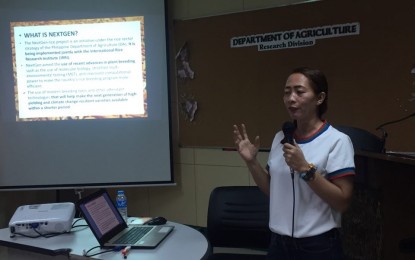
NEXTGEN RICE VARIETIES. Jissel Cardines, DA-11 NextGen focal and science research specialist, presents her study on the next generation or NextGen rice varieties in front of Davao media practitioners on August 27, 2019. The NextGen varieties are being pushed by the Department of Agriculture in Davao Region (Region 11) because of being climate resilient and resistant to pests and diseases. (PNA photo by Che Palicte)
DAVAO CITY -- The Department of Agriculture in Davao Region (Region 11) urged rice farmers in the region to plant the next generation or ‘NextGen’ varieties.
Jissel Cardines, DA-11 NextGen focal and science research specialist, told Philippine News Agency (PNA) on Saturday (Aug. 31) that said varieties are climate-resilient and resistant to pests and diseases.
He said it is an elite inbred and hybrid rice lines developed to attain desirable traits such as high-yielding ability, disease resistant, flood, drought, heat or salinity tolerant.
Cardines bared that elite rice varieties were meticulously monitored from planting to harvesting with farmers using their indigenous knowledge and experience.
Sensory evaluations were also conducted to ensure that said varieties are also palatable and will be acceptable to the consumers. Rice varieties (such as NSIC Rc 216, Rc160, Rc222) bred by the Philippine Rice Research Institute (PhilRice) and Rc 300 produced by the International Rice Research Institute (IRRI) were the top four most preferred rice varieties of Filipino farmers in irrigated lowland fields nationwide, both for dry and wet seasons.
Cardines, who led the NextGen research team, said their 2017-2019 field trials resulted to three emerging varieties in terms of its superior quality and adaptability to most of the region’s ecosystem. These are Rc222, Rc216 and Rc160 which are also recommended by PhilRice.
However, Cardines also clarified that inbred varieties such as Rc402, Rc436, Rc480, Rc 27 and special purpose rice Rc218SR are also good varieties based on their studies, which is suitable in Davao Region’s ecosystem.
“Cost on pesticides can be reduced. As to the production, given the right source, amount and timing of fertilizer application, favorable climate, and good irrigation NextGen varieties yield can reach 9-10 tons per cropping for hybrid and 8-9 tons per cropping for inbred,” she explained.
If not planting the NextGen varieties, Cardines said the normal production ranges from 5-7 tons both hybrid and inbred with the common practice of farmers on rice farm management.
On the other hand, Melani Provido, DA research chief, said farmers including millers and traders should keep an open mind on the emergence of the said varieties not only on its yield performance but also its high acceptability among local rice consumers.
“We urged our partners from the local government as well as our seed producers to promote these varieties for our farmers to plant it and rise above the challenges that confront our local rice industry,” Provido said in one of the recent Field Day on Next Generation Rice Varieties.
NextGen is a product of recent advances in plant breeding and subjected to multi-location testing both by scientist and farmers to identify and select best performing varieties for particular ecosystems.
It became the grain of hope where the local farmers can thrive amid the entry of unlimited rice in the country. (PNA)
